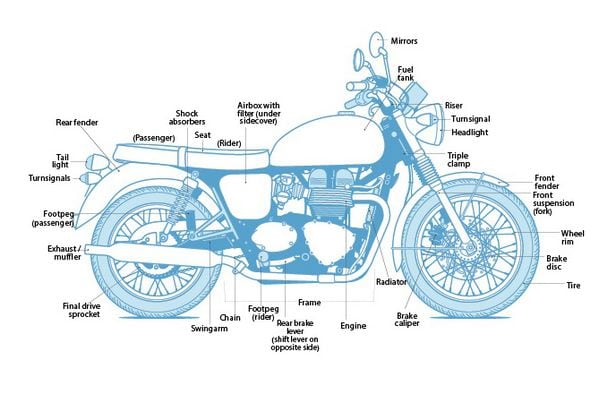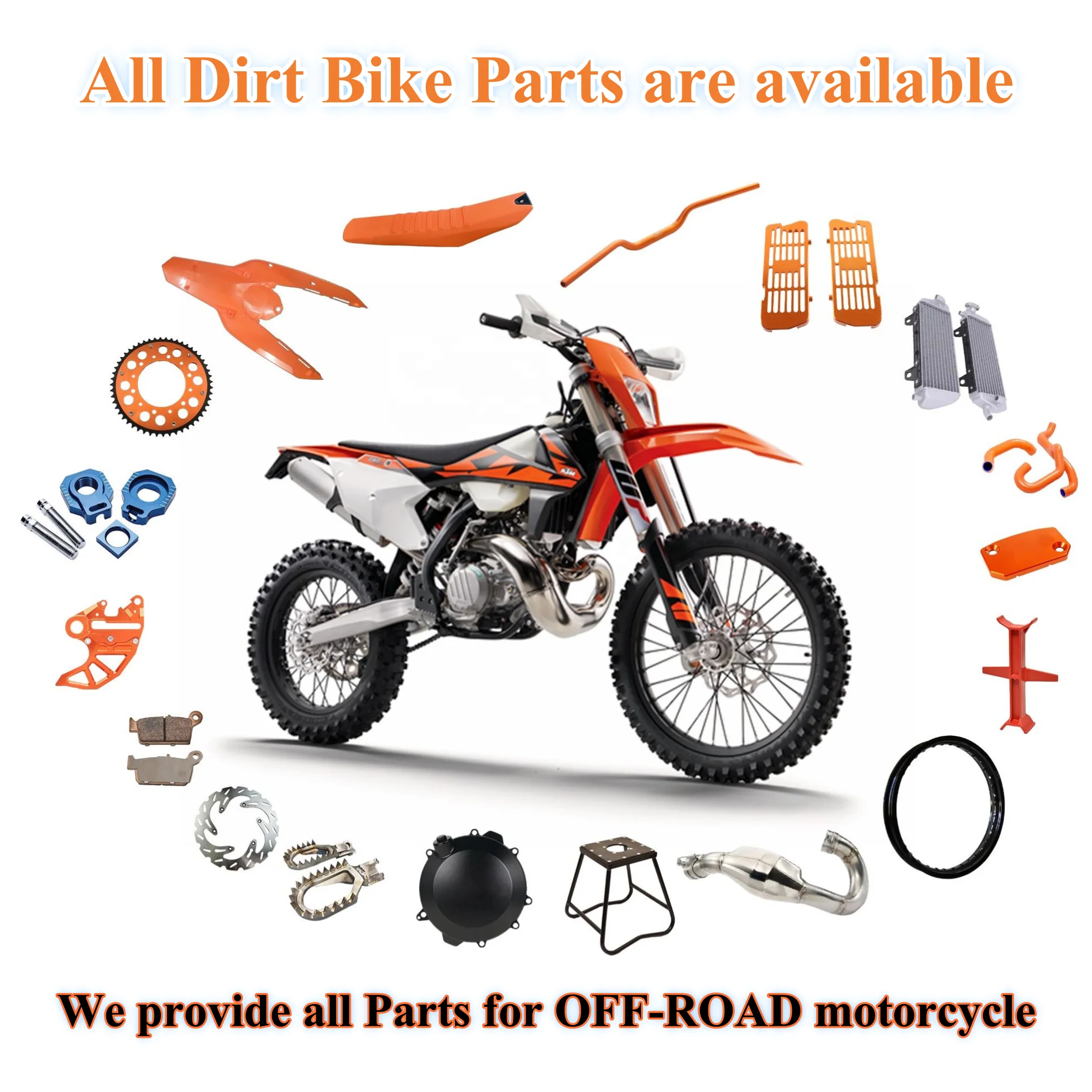Why Riders Prefer Original Motorcycle Parts Auckland Over Aftermarket Brands
Why Riders Prefer Original Motorcycle Parts Auckland Over Aftermarket Brands
Blog Article
Discover the Important Motorcycle Components You Required for Optimum Efficiency
Comprehending the crucial parts of a bike is basic for achieving peak performance. Each part, from the engine to the braking system, plays an important duty in total functionality and safety and security. Normal upkeep can prevent unexpected failures and enhance the riding experience. Several riders forget the intricacies of these systems. Finding how they collaborate can cause a much more effective ride. What important components should every motorcyclist focus on?
The Engine: The Heart of Your Motorbike
The engine offers as the core part of a bike, driving its performance and specifying its abilities. It is accountable for transforming gas into power, which powers the bike forward. Numerous kinds of engines are used, consisting of single-cylinder, V-twin, and inline setups, each offering unique qualities suited for different riding purposes and designs. The engine size, normally gauged in cubic centimeters (cc), considerably affects efficiency, with bigger engines typically offering more power and torque.Furthermore, the engine's design and modern technology, such as fuel injection systems or air-cooling versus liquid-cooling, influence efficiency and reliability. Upkeep is vital for peak operation; factors like normal oil modifications and checking ignition system guarantee longevity. Motorcyclists commonly consider an engine's responsiveness and smoothness, as these features improve the overall riding experience. Eventually, the engine remains a critical element that specifies not only the motorbike's efficiency however additionally the biker's connection to the machine.
The Transmission: Shifting Gears Smoothly
The transmission plays an important function in a motorcycle's efficiency, especially in the mechanics of gear changing. Recognizing how to move gears efficiently can enhance the total riding experience, while regular maintenance guarantees peak capability. Proper attention to these aspects can considerably influence the long life and effectiveness of the bike.

Gear Shifting Mechanics
Smooth gear moving is vital for excellent motorbike performance, significantly influencing both velocity and control. The auto mechanics of equipment moving include the interaction between the clutch, gear bar, and transmission system. When a biker involves the clutch, it disengages the engine from the transmission, allowing for a gear change without harming the elements. A well-timed launch of the clutch, incorporated with specific activity of the equipment lever, promotes a seamless change in between gears. This procedure ensures that the engine runs within its best power band, enhancing efficiency. Motorcycle Parts Auckland. Furthermore, comprehending the gear ratios and their impact on rate and torque can help cyclists make informed options during changes, eventually adding to a more delightful and receptive riding experience
Upkeep Tips Value
Regular maintenance plays an important duty in assuring that the transmission system runs efficiently, enabling for smooth equipment changes. Consistently inspecting and transforming the transmission fluid is important, as old fluid can lead to boosted rubbing and wear. In addition, evaluating the clutch for wear warranties peak interaction and disengagement, protecting against slippage during gear adjustments. Lubrication of moving components is just as essential to decrease friction and improve performance. Bike owners must additionally keep an eye on for leakages and uncommon sounds, as these can indicate underlying issues. By sticking to these maintenance pointers, riders can extend the life-span of their transmission system, guaranteeing that equipment shifts continue to be seamless and contributing to the overall efficiency of their motorcycle.
The Braking System: Ensuring Safety And Security on Every Ride
Braking systems are fundamental elements that directly affect a motorbike's safety and performance. They include various components, consisting of brake pads, rotors, calipers, and hydraulic lines, all collaborating to ensure efficient deceleration. The sort of stopping system-- generally either disc or drum-- impacts responsiveness and stopping power.Regular maintenance is necessary to promote peak efficiency; worn brake pads can lead to lowered performance and increased quiting ranges. Furthermore, the high quality of brake fluid should be monitored, as it can take in dampness over time, compromising braking efficiency.Riders ought to also take into consideration the importance of anti-lock stopping systems (ABDOMINAL MUSCLE), which prevent wheel lockup throughout sudden stops, boosting general safety. Effectively functioning brakes are not practically stopping; they impart confidence in the cyclist, permitting safer navigation through different terrains. Inevitably, a dependable braking system is critical for appreciating every ride with assurance.
The Suspension: Enhancing Convenience and Control
A well-functioning shock absorber considerably adds to a motorcycle's overall performance, enhancing the efficiency of the stopping system. The suspension plays a considerable duty in taking in shocks from uneven surface areas, guaranteeing a smoother trip while maintaining tire contact with the roadway. This contact is crucial for both security and control, enabling motorcyclists to navigate corners with self-confidence and precision.Different sorts of shock absorber, such as telescopic forks or mono-shocks, supply differing degrees of convenience and handling. Correctly tuned suspension improves responsiveness, supplying the cyclist with a more connected feeling to the motorbike. Routine maintenance checks are necessary to identify the suspension elements, consisting of springtimes and dampers, are operating at their finest. A reliable shock absorber not only elevates the riding experience but additionally adds to the long life of other motorcycle components by lessening damage. Therefore, purchasing top quality suspension is important for any type of serious motorcycle enthusiast.
The Tires: Connecting You to the Road
Tires play a necessary duty in a motorcycle's performance, working as the key web link in between the road and the motorcyclist. Comprehending the different kinds of tires available can considerably impact taking care of and security. In addition, routine upkeep is important to ensure peak tire performance and long life.
Tire Types Explained
How do various tire kinds affect a motorcycle's performance? Tire kinds play a vital role in establishing a motorbike's stability, hold, and handling. Sporting activity tires, created for high efficiency, deal improved grip and responsiveness on paved roadways, making them ideal for competing and aggressive riding. Alternatively, touring tires prioritize toughness and comfort, resource providing a smoother trip for long-distance traveling. Off-road tires, identified by their rugged walk patterns, master grip on unpaved surfaces, ideal for experience enthusiasts. Furthermore, dual-sport tires mix features from both on-road and off-road groups, accommodating versatile riding needs. Eventually, choosing the best tire type is vital for optimizing efficiency, ensuring safety and security, and boosting the overall riding experience.
Upkeep Tips Offered
While riding when driving, keeping suitable tire condition is vital for safety and efficiency. On a regular basis examining tire pressure is essential, as under-inflated tires can bring about bad handling and increased wear. It is advisable to check step deepness regularly; worn tires concession grasp and stability. In addition, motorcyclists must search for indications of damages, such as bulges or cracks, which can show the need for replacement. Rotating tires regularly ensures even use, boosting durability. In addition, keeping tires clean from particles and avoiding excessive aesthetics can lengthen their lifespan. Finally, preserving proper placement and equilibrium contributes to peak performance, reducing stress and anxiety on other bike parts. Complying with these maintenance tips will considerably enhance the total riding experience.
The Gas System: Fueling Performance and Effectiveness
The fuel system plays an essential role in taking full advantage of a motorcycle's efficiency and efficiency, as it assures the optimal delivery of fuel to the engine. It makes up numerous vital elements, including the gas storage tank, fuel pump, gas filter, and fuel injectors or carburetor. Each part must function properly to assure a powerful and smooth ride.The gas container shops gas and provides it to the engine via the fuel pump, which creates the necessary pressure. A gas filter protects against pollutants from entering the engine, while the injectors or carburetor mix fuel with air for combustion.Proper upkeep of the gas system is vital; a clogged up filter or malfunctioning injector can cause decreased efficiency and enhanced get redirected here fuel intake. By verifying that the gas system operates successfully, riders can appreciate better throttle reaction, far better gas economic climate, and overall enhanced riding experience.
The Electrical System: Powering Your Experience
A reliable electrical system is crucial for the overall capability and safety of a motorcycle, as it powers important components such as the ignition, illumination, and various electronic systems. This system consists of the battery, which stores energy, and the alternator, in charge of creating power while the engine runs. The circuitry harness connects these parts, making sure reputable power distribution.Additionally, integrates shield the system from overloads, while relays aid regulate high-current gadgets with low-power signals. A well-kept electric system enhances performance by ensuring smooth begins and constant procedure of signals and lights, crucial for motorcyclist visibility and safety.Regular checks of the battery's fee and links are essential for avoiding electric failures. Bikers must additionally inspect circuitry for damage, making certain all components function preferably. Eventually, a robust electrical system adds substantially to the total performance and integrity of the motorbike.
Regularly Asked Inquiries
Just how Commonly Should I Replace My Motorcycle's Battery?
The frequency of motorcycle battery replacement depends on usage and maintenance (Motorcycle Spares Christchurch). Typically, batteries ought to be changed every 3 to 5 years. Routine checks can aid identify when a substitute is required for peak performance
What Tools Do I Required for Standard Bike Maintenance?
For standard motorcycle maintenance, one calls for important tools such as an outlet collection, wrenches, screwdrivers, pliers, tire stress scale, see this site and a torque wrench. These devices assist in effective upkeep and assure the motorbike runs successfully and securely.
Exactly How Can I Improve My Bike's The rules of aerodynamics?
To boost bike aerodynamics, one need to think about changing fairings, utilizing windscreen extensions, optimizing body placement, and minimizing total weight. These alterations aid lessen drag, boosting stability and gas effectiveness throughout experiences.
What Are the Indicators of a Failing Electrical System?
Indicators of a falling short electric system consist of dimming lights, difficulty starting, uneven instrument analyses, and blown fuses. Motorbike Components NZ. Unusual scents or deterioration around battery terminals might additionally suggest underlying issues needing instant attention for security and performance

Just how Do I Choose the Right Oil for My Motorbike?
When choosing oil for a motorcycle, one must take into consideration the maker's specifications, thickness ratings, and the sort of riding. Furthermore, artificial versus conventional oil can influence efficiency and engine defense, affecting the decision substantially. The engine size, usually measured in cubic centimeters (cc), substantially affects efficiency, with larger engines normally offering more power and torque.Furthermore, the engine's layout and innovation, such as gas injection systems or air-cooling versus liquid-cooling, affect effectiveness and dependability. A well-functioning suspension system substantially adds to a motorcycle's total performance, complementing the performance of the stopping system. The fuel system plays a vital function in making best use of a motorcycle's performance and efficiency, as it ensures the optimal delivery of fuel to the engine. A fuel filter protects against contaminants from entering the engine, while the injectors or carburetor mix gas with air for combustion.Proper maintenance of the gas system is crucial; a clogged filter or malfunctioning injector can lead to decreased performance and boosted gas consumption. A properly maintained electric system enhances efficiency by making certain smooth beginnings and regular operation of lights and signals, vital for cyclist presence and safety.Regular checks of the battery's cost and links are essential for avoiding electric failings.
Report this page